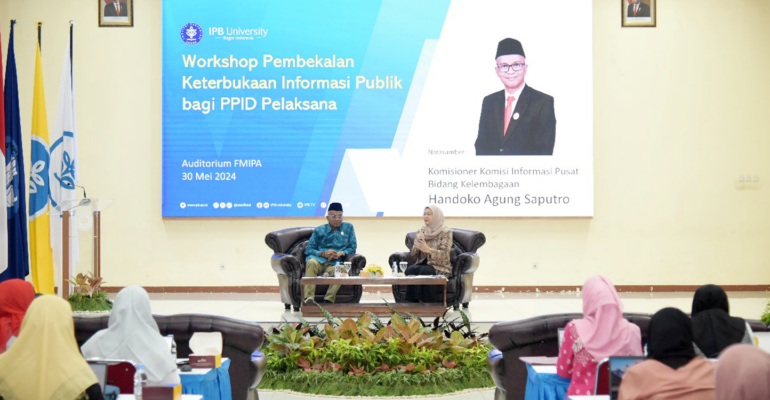IPB University Leaders Get Debriefing on Public Information Disclosure from the Central Information Commission

The leadership of IPB University as the Implementing Information Management and Documentation Officer (PPID) received a briefing on public information disclosure directly from the Central Information Commission (KIP). The leaders of IPB University are deans, heads of institutions, directors, chiefs of offices, chiefs of bureaus, chiefs of agencies, vice chiefs of institutions, chiefs of supporting units, chiefs of sections, field assistants, assistant directors and administrative chiefs of faculties/schools.
The event was held in the Auditorium of the Faculty of Mathematics and Natural Sciences (FMIPA), IPB Dramaga Campus (30/5). Through the ‘Workshop on Public Information Disclosure Debriefing for PPID Implementers’, the Head of Institutional Division of the Central Information Commission (KIP), Handoko Agung Saputro, SSos and KIP Expert, Siti Ajijah, SH, MH were present to give the debriefing.
Secretary of IPB University as PPID IPB University, Prof Agus Purwito in his speech conveyed the development of public information disclosure managed by IPB University is getting better. This is proven, for six consecutive years (2018-2013) IPB University won the title as an Informative Public Agency from KIP.
“Thankfully, PPID IPB University is very good. However, it is important for PPID Implementers not only around the rectorate, so it needs to be expanded. All must be able to answer questions from the public. This is a good thing,” he said.
Furthermore, Prof Agus Purwito conveyed the importance of PPID implementers to implement Law No 14 of 2008 concerning Public Information Disclosure. The regulation requires public bodies to provide access to the public to obtain information.
In addition, he also reviewed exempt information, which based on the consequence test cannot be disclosed due to certain risks regulated in the law such as endangering state security, affecting the law enforcement process, is private information, and so on.
Ir Yatri Indah Kusumastuti, Chief of Communication Bureau of IPB University added that IPB University started to manage PPID since 2015 after the rector made a decree (SK) related to public information disclosure. Since then, she said, improvements have continued to be made so that every year it can be categorised as an informative public body. ‘Of course, by obtaining this predicate, we do not stop learning,’ she said.
Handoko Agung Saputro, KIP Commissioner for Institutional Affairs at the meeting conveyed several problems that often occur in public institutions. Although at the institutional level information disclosure is very good, but it can be in the auxiliary units are not uniform.
“Therefore, there must be uniformity in what to convey, what needs to be kept. I suggest at the beginning of each year to compile a list of public information (DIP),” he said.
He hopes that universities can become the centre of public information disclosure. Universities must be an example, as agents of change. “Campuses should play that role because they are centres of knowledge,” he added.
Meanwhile, Siti Ajijah, KIP Expert, emphasised the preparation of DIP and the classification of exempt information (KID). Quoting Government Regulation No 61/2010, she explained that KID is information that cannot be accessed by public information applicants as referred to in the Law on Public Information Disclosure Public Information Disclosure Act.
“Exempt public information is strict and limited. Exempt public information is confidential in accordance with the law, propriety, and public interest based on a test of consequences,” she explained.
For this reason, he emphasised that PPIDs in every public body must conduct a careful and thorough consequence test before declaring certain public information exempt declaring certain public information exempt for access by the public. (dh/Rz) (IAAS/RUM)



